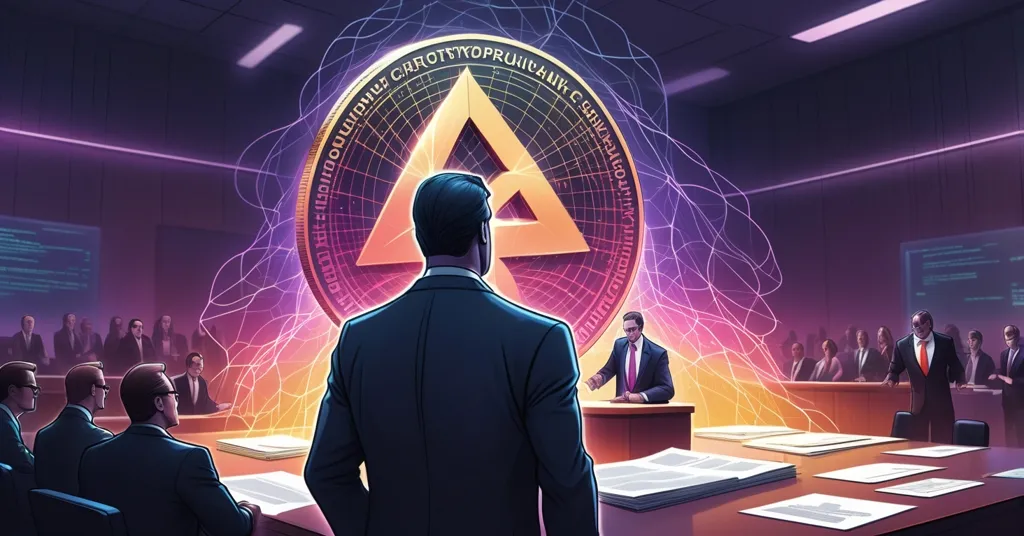SEC Unlikely to Drop XRP Lawsuit at Crypto Week 2025: Ripple Case Update

Fact Check: Will SEC Drop XRP Lawsuit During Crypto Week 2025? Ripple Update
Rumors have been swirling in the crypto sphere that the U.S. Securities and Exchange Commission (SEC) might finally put an end to its marathon lawsuit against Ripple Labs during Crypto Week in July 2025. With social media ablaze and XRP supporters hyped up over a scheduled SEC closed-door meeting, the question on everyone’s mind is: could this be the moment of clarity we’ve all been waiting for? Let’s cut through the noise and get to the facts.
- Rumor Source: Speculation ties an SEC meeting on July 10, 2025, during Crypto Week, to a possible resolution of the Ripple lawsuit.
- Likelihood: Legal experts and procedural timelines suggest a resolution this soon is highly improbable.
- Broader Stakes: The outcome could shape cryptocurrency regulation far beyond XRP.
The Rumor: Crypto Week Resolution?
The buzz started in the restless depths of crypto forums and Twitter threads, where XRP enthusiasts pointed to an SEC closed-door meeting on July 10, 2025, as a potential game-changer. Under the Government in the Sunshine Act, the meeting’s agenda vaguely referenced “resolution of litigation claims,” sparking wild hope among supporters that this could signal the end of the SEC’s legal battle with Ripple Labs. Crypto Week, a period often marked by big announcements and heightened market activity, added fuel to the fire. XRP holders, exhausted after years of legal uncertainty since the lawsuit kicked off in December 2020, saw this as a beacon of hope for regulatory clarity. Meanwhile, market data showed a notable XRP price surge, with $270 million moved to self-custody wallets over a recent seven-day period, hinting at investors preparing for a long-term hold rather than a quick speculative flip.
Legal Reality: Why It’s Unlikely
Before we get carried away, let’s slam on the brakes with some cold, hard reality. The Ripple-SEC lawsuit revolves around whether XRP, the cryptocurrency tied to Ripple Labs, qualifies as an unregistered security—a classification that could ripple through the entire crypto industry. For the uninitiated, a “security” under U.S. law is typically an investment contract tied to a company’s performance, and the SEC alleges Ripple sold XRP without proper registration. A landmark ruling in July 2023 by Judge Analisa Torres offered a split decision: programmatic sales (those automated through exchanges to retail investors) weren’t securities, but direct institutional sales violated securities laws, resulting in a $125 million penalty for Ripple. Recent joint motions to slash this fine to $50 million were shot down on procedural grounds, as detailed in recent SEC meeting updates.
Fast forward to 2025, and the case is in a bureaucratic limbo. Ripple dropped its cross-appeal (a counter-appeal responding to the SEC’s initial appeal) in June 2025, while the SEC withdrew its appeal back in March 2025. However, these withdrawals aren’t fully formalized, and no new motions are pending. This means Judge Torres has no jurisdiction to act—at least not until after July 14, and likely well beyond, according to the latest rulings on the cross-appeal status. Former SEC lawyer Marc Fagel has been blunt about the glacial pace of these processes, offering a much-needed reality check.
“It usually takes a month or two for a vote on an enforcement recommendation, so people need to chill. There’s a process.”
Fagel’s point is clear: even if the SEC were mulling a settlement or full withdrawal, internal votes and procedural hoops don’t align with a dramatic Crypto Week reveal. Legal analyst James K. Filan echoes this, noting that without formal filings, the court can’t budge, a perspective supported by Fagel’s expert analysis on lawsuit timelines. Ripple’s Chief Legal Officer, Stuart Alderoty, while optimistic about past wins, has tempered expectations for an immediate breakthrough, focusing instead on refiling motions to inch the case forward. Simply put, the legal system doesn’t care about your conference schedule or viral hashtags. Expecting a resolution in days when the SEC moves slower than a bureaucracy on holiday is pure fantasy.
Market Reactions: XRP Price and Investor Behavior
Despite the long odds, XRP’s market has reacted with cautious optimism. The recent price bump isn’t just noise—data shows a maturing investor base, with significant volumes shifting to self-custody, meaning holders are moving tokens off exchanges into personal wallets for safekeeping. This contrasts sharply with past XRP rallies driven by retail FOMO (fear of missing out), suggesting a shift toward long-term confidence over short-term gambling. But let’s be brutally honest: anyone peddling “parabolic surge” predictions of 100% gains post-resolution—yes, I’m looking at certain YouTube shillers—is selling snake oil. These baseless claims, often masked as “technical analysis,” are the kind of garbage that burns retail investors and taints crypto’s reputation. We’re not here to hype; we’re here to dissect. Sentiment drives markets, sure, but without legal clarity, betting big on rumors is a sucker’s game, a concern also raised in discussions on XRP lawsuit updates for 2025.
Big Picture: Crypto’s Regulatory Future
This isn’t just about XRP or Ripple Labs—it’s a crucible for the entire cryptocurrency ecosystem. A final ruling or settlement could set a precedent for how digital assets are classified under U.S. securities law, impacting everything from governance tokens on Ethereum to obscure altcoins. If XRP gains clear status, major exchanges might relist it, institutional money could pour in, and XRP-based ETFs (exchange-traded funds) might even hit the market. For champions of decentralization, the partial 2023 win—XRP not being a security in secondary sales—is a quiet victory against regulatory overreach. It’s a small crack in the wall of centralized control, a reminder that innovation can sometimes outpace outdated laws, as explored in broader discussions about the SEC lawsuit’s impact on crypto regulation.
Yet, not everyone’s cheering. Bitcoin maximalists, who see BTC as the only true decentralized currency, often roll their eyes at XRP’s setup. Ripple Labs’ heavy influence over XRP’s supply and ecosystem—holding a massive chunk of tokens in escrow—feels like a far cry from Bitcoin’s trustless, no-middleman ethos. And they’ve got a point: if decentralization is the goal, XRP’s structure raises valid questions. Still, let’s not throw the baby out with the bathwater. XRP’s niche in cross-border payments, through RippleNet’s partnerships with banks to replace clunky systems like SWIFT, tackles a problem Bitcoin isn’t designed to solve. BTC is sound money, a store of value; XRP aims to be a transactional workhorse. This diversity of purpose—Bitcoin as digital gold, altcoins carving out use cases—is what fuels the financial revolution we’re all rooting for.
From an accelerationist angle, resolving this case could be a turbo boost for crypto adoption. Clear rules, or at least clearer battle lines, might unshackle innovation across altcoin ecosystems, even if Bitcoin remains king. Imagine a world where startups don’t fear the SEC’s lawsuit hammer every time they launch a token—clarity on XRP could pave that path. Disruption of the financial status quo isn’t a solo act; it’s a collective push, with each chain playing its part.
The Dark Side: Regulatory Chokeholds and Innovation Stifling
But let’s not get too starry-eyed. The prolonged uncertainty around XRP is a glaring reminder of the regulatory guillotine hovering over crypto’s neck. The SEC’s “sue now, clarify later” strategy—seen not just with Ripple but in actions against Coinbase, Binance, and others—creates a chilling effect. Small projects without Ripple’s legal war chest can’t afford to fight these battles, forcing them to delay launches or flee to friendlier jurisdictions, a point underscored by analyses of SEC policies impacting blockchain innovation. While we push for freedom and privacy, the harsh truth is that navigating this legal minefield often traps us in the very centralized systems we’re trying to dismantle. It’s a bitter irony: the fight for decentralization gets mired in centralized courtrooms.
Playing devil’s advocate for a moment, one could argue the SEC’s heavy hand might protect retail investors from scams and rug pulls that plague the space. Fair enough—nobody wants another Squid Game token disaster. But here’s the rebuttal: clarity, not endless litigation, is the better shield. Define the rules upfront instead of weaponizing ambiguity, and you’ll foster trust without killing innovation. The SEC’s approach feels less like protection and more like a deliberate stranglehold, dragging out cases like Ripple’s for years while the industry bleeds momentum, a perspective reinforced by legal analyses of the 2025 developments.
What if this drags on another year? Continued limbo could cement XRP’s status as a regulatory pariah, discouraging institutional adoption and sidelining it from broader market trends. Alternatively, a partial settlement—say, XRP classified as a security only in specific contexts—might create a messy patchwork of compliance that confuses more than it clarifies, as speculated in fact-checking reports on the lawsuit’s potential resolution. Either way, the ripple effects (pun intended) could reshape altcoin strategies or reinforce Bitcoin’s dominance as the “safe” crypto in regulators’ eyes. These are speculative outcomes, but they’re grounded in the stakes at play.
Key Takeaways and Questions for Reflection
- What triggered the rumor of an SEC resolution for the XRP lawsuit during Crypto Week?
Social media and crypto forums latched onto an SEC closed-door meeting on July 10, 2025, during Crypto Week, with XRP supporters hoping for a dramatic end to the legal battle. - Is a resolution during Crypto Week 2025 realistically possible?
No, it’s highly unlikely—expert Marc Fagel highlights that SEC votes on enforcement actions take one to two months, and Judge Torres currently lacks jurisdiction to act. - What’s the latest on the Ripple-SEC lawsuit?
The case is stalled; Ripple dropped its cross-appeal in June 2025, the SEC did so in March, but formal dismissals and new motions are still pending, delaying any closure. - Why does this lawsuit matter for the broader crypto industry?
It’s a test case for U.S. crypto regulation, potentially defining how digital assets are classified and influencing exchange listings, institutional adoption, and innovation across blockchain projects. - Should investors act on XRP price surge hype tied to these rumors?
Absolutely not—while sentiment fuels short-term gains, baseless predictions are reckless, and the trend toward self-custody reflects wiser, long-term thinking over speculative bets.
The XRP community’s hope for a quick resolution is understandable—years of legal purgatory will do that to you. But the harsh reality is that the SEC and the courts don’t operate on hype or event timelines. Crypto Week 2025 will likely come and go without a bombshell announcement for Ripple. Still, the bigger fight remains electrifying. This case is a battleground for the future of crypto regulation, for decentralization, and for financial freedom. We’re in the corner of disruption and clarity, but we’re not banking on a Hollywood ending anytime soon. Stay skeptical, dig into the details, and let’s keep pushing the boundaries of what this technology can achieve.



